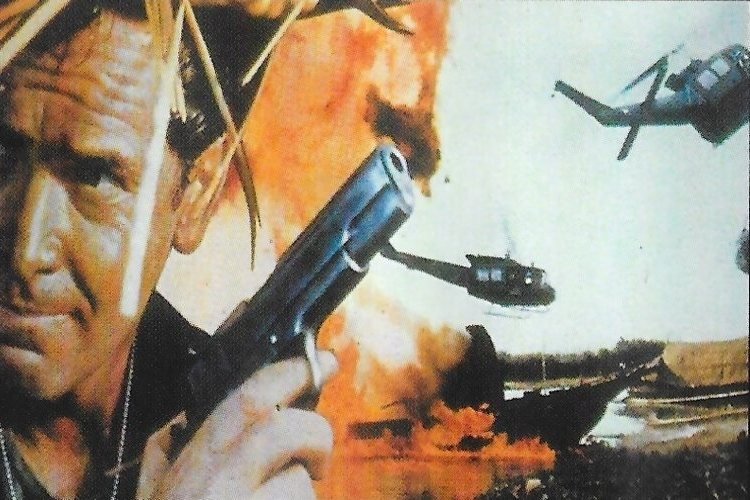THE LAST HUNTER (1980): The Vietnam War In A Italian Funhouse Mirror
There are two things Schlockmania loves about Italian genre cinema of the '70s and '80s. The first is its habit of taking a popular American film and doing a homegrown knockoff that feels similar yet different because the filmmakers add their own quirky Neapolitan elements into the mix. The second is how their depictions of American life/attitudes/behavior are mixture of distorted impressions and sheer bluffing, resulting in something that seems like a bizarre, "funhouse mirror" reflection of Americana.
These two threads of Italo-genre fare enjoy a perfect convergence in The Last Hunter, a wild and woolly war flick from veteran Antonio Margheriti, a.k.a. "Anthony M. Dawson." The premise revolves around the beleaguered Captain Morris (David Warbeck): at the beginning, he sees his best friend commit a murder/suicide as a Vietnam town blows up around them. He subsequently goes on a secret mission with a small band of soldiers including Sgt. Washington (Tony King) and photog Jane (Tisa Farrow). Things get more surreal and violent the further he goes in country, culminating in a finale where personal and wartime tragedies converge.
A viewing of The Last Hunter will reveal that it is designed to capitalize on the international popularity of The Deer Hunter and Apocalypse Now but that can't prepare you for the sheer weirdness of how it goes about its business. For example, there is a lengthy sequence with a commander (John Steiner) who keeps his men in a hollowed-out mountain, listens to recordings of gunfire for fun and sends soldiers who annoy him out into the warzone to fetch coconuts. Also, Morris's mission is revealed to involve taking out a mysterious pirate broadcaster who encourages American soldiers to put down their weapons and go home to their women (!).
The treatment of this oddball material just ups the ante further: Margheriti directs the film in a style you could call "muscular pulp," with bold, comic book-styled framing and bombastic action that includes everything from exploding miniatures to real helicopters flying through real explosions. The dialogue is rife with weird interpretations of American slang and military practices. There's also a catchy Franco Micalizzi score than leans heavily on disco and lounge stylings.
Best of all for Italian genre fans, the cast is packed with familiar faces: Warbeck makes a sturdy, convincingly cynical lead while Steiner does one of his trademark eccentric characterizations. King offers a spirited turn as the bravest of the soldiers, particularly during the action sequences, as does Bobby Rhodes as another soldier in the unit.However, beneath all the eccentricity and explosions, The Last Hunter is unexpectedly sincere in depicting a dark vision of the Vietnam War: it presents a scenario where burnt-out soldiers are pushed through battle after battle, never given the support they need and crumble psychologically under the strain. These are the same messages you would get from The Deer Hunter or Apocalypse Now but those films never would feature a big display exploding miniature planes and trains.
Also, neither film would go for a twist ending as utterly bonkers as the one in The Last Hunter. Without getting into spoilers, let's just say the finale is built around a plot twist/reveal so absurd in concept that it tests your sanity... yet the film forcefully delivers that wacko twist ending in a way that is strangely heartfelt. That dichotomy is acts as a microcosm of what is going on throughout this film... and its skewed version of American-style war films makes it a must for students of Italian genre fare.
Blu-Ray Notes: Code Red recently released a new blu-ray of this title with the best visual presentation of this film yet as well as new interviews with King and Steiner. Italo-genre cultists, take note - this is the version to get.




